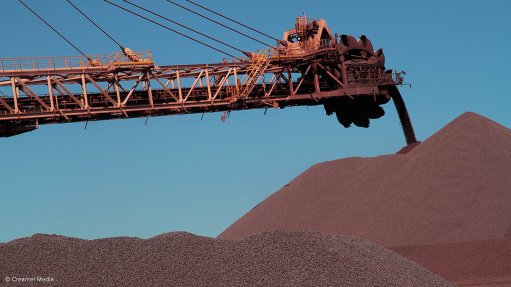
Photo by: Duane Daws
TORONTO (miningweekly.com) – Benchmark iron-ore prices, which had fallen by more than one-third since the start of the year, last week breached the $90/t level and continued to spiral lower to 86.2/t on Monday, as a supply glut faces reduced demand growth from the commodity’s largest consumer, China.
London-based fund manager SP Angel on Tuesday in a note to clients said Chinese iron-ore consumption was expected to rise by 3% to 5%, noting that the actual rate of consumption could in fact be closer to zero.
The firm added that global diversified miners Rio Tinto and BHP Billiton continued to hold their views that this fall in consumption would hit domestic higher-cost producers with 125-million tonnes expected to be taken out of the market.
“Our analysis in February showed that with Chinese demand growth at 1%, a surplus of 70-million tonnes could be expected against 1% global growth. This builds up rapidly to close to 200-million tonnes in 2015 if Chinese growth stagnates at this level,” SP Angel Corporate Finance director and senior research analyst Carole Ferguson said on Tuesday.
Weak Chinese data led to Asian stock markets rising as the market was building in some form of stimulation to counter the slowing Chinese economy, Ferguson added, noting that stimulation in China and an increase in global demand could change the picture.
Iron-ore prices were likely to stay in the range of $90/t to $100/t in this environment, making life difficult for any new market entrants, which would be unable to apply the same economies of scale as the majors were doing.
Meanwhile, the firm also noted that West African iron-ore from Sierra Leone could attract an "Ebola premium" in terms of transport costs.
Ferguson noted that West African iron-ore juniors African Minerals and London Mining could face higher freight charges, as some vessels were asking premiums to call in Freetown owing to the heightened health risk. However, a Bloomberg report stated that it was business as usual at the port.
London Mining estimated $1 per wet metric tonne for Ebola-related costs.